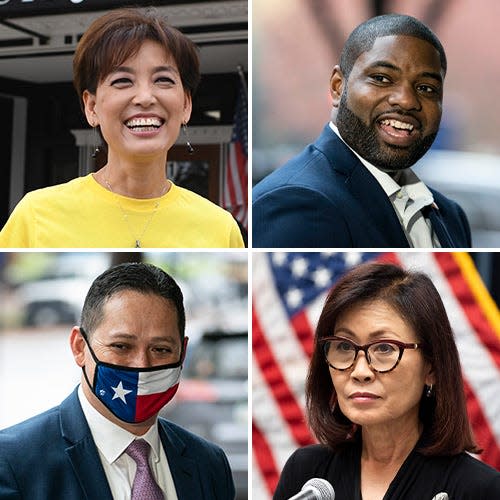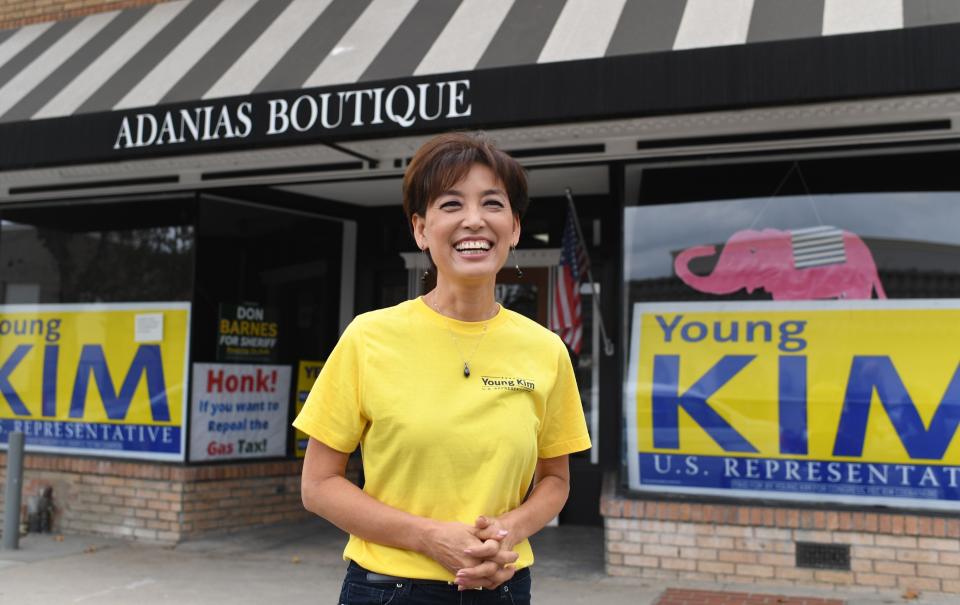Congress' new crop of diverse Republicans face option of joining Democrat-leaning minority caucuses. Will they?
WASHINGTON – The most diverse Congress yet is poised to take office in January with 124 non-white members, including Republicans, that could put more focus on the traditionally Democrat-dominated groups formed by these members of color.
Republicans gained nine non-white members in the 2020 election. Though the GOP still has far fewer members of color than Democrats, the gains are notable for a party often criticized for not reflecting the diversity of the country. In 2018, Republicans only added one new non-white member to their ranks. The mini-wave this year could force some minority caucuses to accommodate members with opposing views.
These groups – the Congressional Asian Pacific American, Black, Hispanic, and Native American Caucuses – are comprised of lawmakers of the same ethnicity, race or shared interest. They often have taken the lead on issues important to their communities and hold powerful sway when Congress considers policy affecting minority populations. Over the past two years, for example, the Congressional Black Caucus led the House’s police reforms introduced in the wake of George Floyd's death, and the Congressional Hispanic and Asian Pacific American Caucuses have taken point on immigration-related issues.
They flexed their muscle most recently during the transition to President-elect Joe Biden’s new administration, advocating for Cabinet candidates from their respective communities. The Hispanic Caucus had been a major booster of Xavier Becerra, the nominee for Health and Human Services secretary, for example.
'The moment of truth': The Electoral College prepares to hand Trump the loss he refuses to accept
More: Biden names top White House and cabinet positions
But these caucuses are often made up of mostly Democrats. There are currently no Republicans in the Asian, Hispanic or Black Caucuses. The Native American Caucus is already a bipartisan group, with Democratic and Republican co-chairs.
With the crop of diverse Republicans entering the U.S. Capitol next month, the caucuses need to consider how to incorporate people from across the aisle, especially if they were to continue operating as groups that are “bigger than the party,” said University of Wisconsin-Milwaukee professor of political science Paru Shah. If there are more Republican members, even if their numbers were too small to force a significant policy shift, "there might be more opportunities to have real dialogue or conversations" on issues.

Heading into the new Congress, some of the incoming Republican members want to join these caucuses, though some are undecided and others have flatly rejected joining them.
Experts told USA TODAY the increased diversity among Republicans in Congress was part of a broader trend even if the absolute number of GOP members of color was still lower than Democrats.
Shah, who researches race and politics, said the increase in diversity in Congress was “a long time coming,” but noted Republicans were still “decades behind Democrats in terms of their numbers,” which could hinder their ability to influence change in any of the caucuses.
Government shutdown: Senate unanimously passes bill pushing shutdown deadline by one week
In the next Congress, there will still be more than five times as many Democratic members of color compared to Republicans, with 20 Republicans who are people of color in the House and Senate, compared with 104 Democrats.
Emory University political science Professor Bernard Fraga, who studies racial and ethnic politics, told USA TODAY the growing number of Republican lawmakers of color was part of a “substantial diversification that outpaces the diversification we see in the Republican electorate.”
“Republican voters who might have had some resistance to minority candidates in the past are perfectly willing to vote for minority candidates when they’re from the same party,” he said, as party identification became a bigger concern to voters than the actual demographics of the candidate.
Going into the next Congress, prominent lawmakers of color told USA TODAY Republicans could be allowed into the caucuses if they do choose to join. It is not unheard of for a Republican person of color to join the groups, but their membership bids have at times been contentious if they don't agree on policy, especially given the leftward lean of the caucuses.
The Black Caucus opposed the Supreme Court nomination of Justice Amy Coney Barrett, for example, and its incoming chair Rep. Joyce Beatty, D-Ohio, is a frequent critic of President Donald Trump.
In 2017, a majority of Hispanic Caucus members voted to reject then-Republican Rep. Carlos Curbelo of Florida. He had wanted to join the caucus to work on immigration-related issues, but the caucus denied his bid because he “did not share their values,” which Curbelo told USA TODAY "essentially meant that I wasn’t a Democrat.”
But now, Curbelo said he hoped the Hispanic Caucus would “grow up,” acknowledge the numbers of Hispanics who voted for Republicans and allow Republicans to join in the future if they wanted to do so. Curbelo, a Cuban-American, represented a majority-Hispanic district in South Florida, a community where Trump made inroads this year even as Hispanic communities nationally favored Biden.
Rep. Marcia Fudge, D-Ohio, a former chairwoman of the Congressional Black Caucus and Biden’s nominee to lead the Department of Housing and Urban Development, told USA TODAY lawmakers were welcome to join the Black Caucus as long as they were Black.
As chairwoman, she said, she personally called incoming Black Republicans like former Rep. Mia Love of Utah, Rep. Will Hurd of Texas and Sen. Tim Scott of South Carolina, to ask them to join.
“It’s not like we haven’t had Republicans in the caucus,” she said, though she said Scott told her he did not want to be in a separate group, and Hurd also declined to join. Scott went on to help Senate Republicans present their own alternative to the criminal justice reforms championed by the Black Caucus and House Democrats last summer.
Love was a member of the group until she lost reelection in 2018. The Republican who recently won her Salt Lake City-area seat, congressman-elect Burgess Owens, said he would not be a member of the Black Caucus, telling conservative outlet Newsmax he wanted “nothing to do” with it and calling it a “pro-abortion, anti-education" group.
Rep. Judy Chu, D-Calif., the chairwoman of the Congressional Asian Pacific American Caucus, said Republicans would be allowed to join their bipartisan group.
The caucus might split up to discuss partisan issues, she said, but "we will try to come together on issues of common concern."
And the Hispanic Caucus allows anyone of Hispanic descent to join, as long as a majority of members vote to let them in.
More: Latino voters who fled dictatorships fear election was stolen from President Trump
More: Latinos make up only 1% of all local and federal elected officials, and that’s a big problem
Some incoming Republican members of color told USA TODAY they were interested in joining the caucuses despite their mostly Democratic composition.
Congressman-elect Byron Donalds, a Republican set to represent Naples, Florida, said he wanted to join the Black Caucus despite its liberal lean. Donalds had been a member of the Florida Legislature’s Black Caucus during his time in the state Legislature and saw it as important for his voice to be heard in the Congressional Black Caucus too.
Even if the caucus’ generally progressive stances didn’t change, “It's important for the caucus to be aware of what Republican and conservative policy positions are, and how those can have a positive impact on the Black community,” he said.
Rather than try to change the caucuses, some Republicans have made their own separate caucuses in the past. The Congressional Hispanic Conference was formed by Hispanic Republican members in 2003, though it is a much smaller group than the Congressional Hispanic Caucus.

Congresswoman-elect Young Kim, who unseated a Democratic incumbent in Orange County, California, told USA TODAY she had been invited to join the Congressional Asian Pacific American Caucus meetings but had not been able to attend yet due to conflicts.
But Chu was persistent in asking her to attend, she said. Kim ran into the caucus chairwoman and other colleagues at the airport on her way back home, Chu invited her again to attend their meetings, and Kim said she would join.
"I'm very happy to do so," Kim said.
Kim had criticized Trump during the congressional campaign, saying his use of terms like "China virus" and associating the pandemic with the Asian American community was "hurtful to many across our diverse nation." Kim is among the first Korean American women elected to Congress along with Congresswomen-elect Michelle Steel of California and Marilyn Strickland of Washington.
1/2 The President’s continued use of terms associating COVID-19 with the #AAPI community is hurtful to many across our diverse nation. As I have said in the past, no American of any race or ethnic group, is responsible for this virus.
— Young Kim (@YoungKimCA) June 21, 2020
Steel, another incoming Republican from Orange County who'd beaten a Democratic incumbent, told USA TODAY she was undecided on joining the Congressional Asian Pacific American Caucus, but she was thinking of how to "use these caucuses to mobilize more Asian Americans out there, so I really have to look at it."
Steel had won her race by "sticking to the issues" and knocking on doors, not focusing on her opponent, she said. As a member of the Orange County Board of Supervisors, amid controversy over police brutality, she arranged the declaration of a "Law Enforcement Appreciation Day" in the county, she said.
One other Republican freshman, Congressman-elect Tony Gonzales, who won a competitive House race in western Texas, told USA TODAY he was undecided about joining the Congressional Hispanic Caucus, noting Curbelo's rejection, though he would “certainly take a look” at them.
“To me, it’s about what you do with your time, not necessarily what caucus you’re associated with,” he said.

Contributing: Deborah Barfield Berry
This article originally appeared on USA TODAY: Congress 2021: Will diverse Republicans join minority caucuses?

